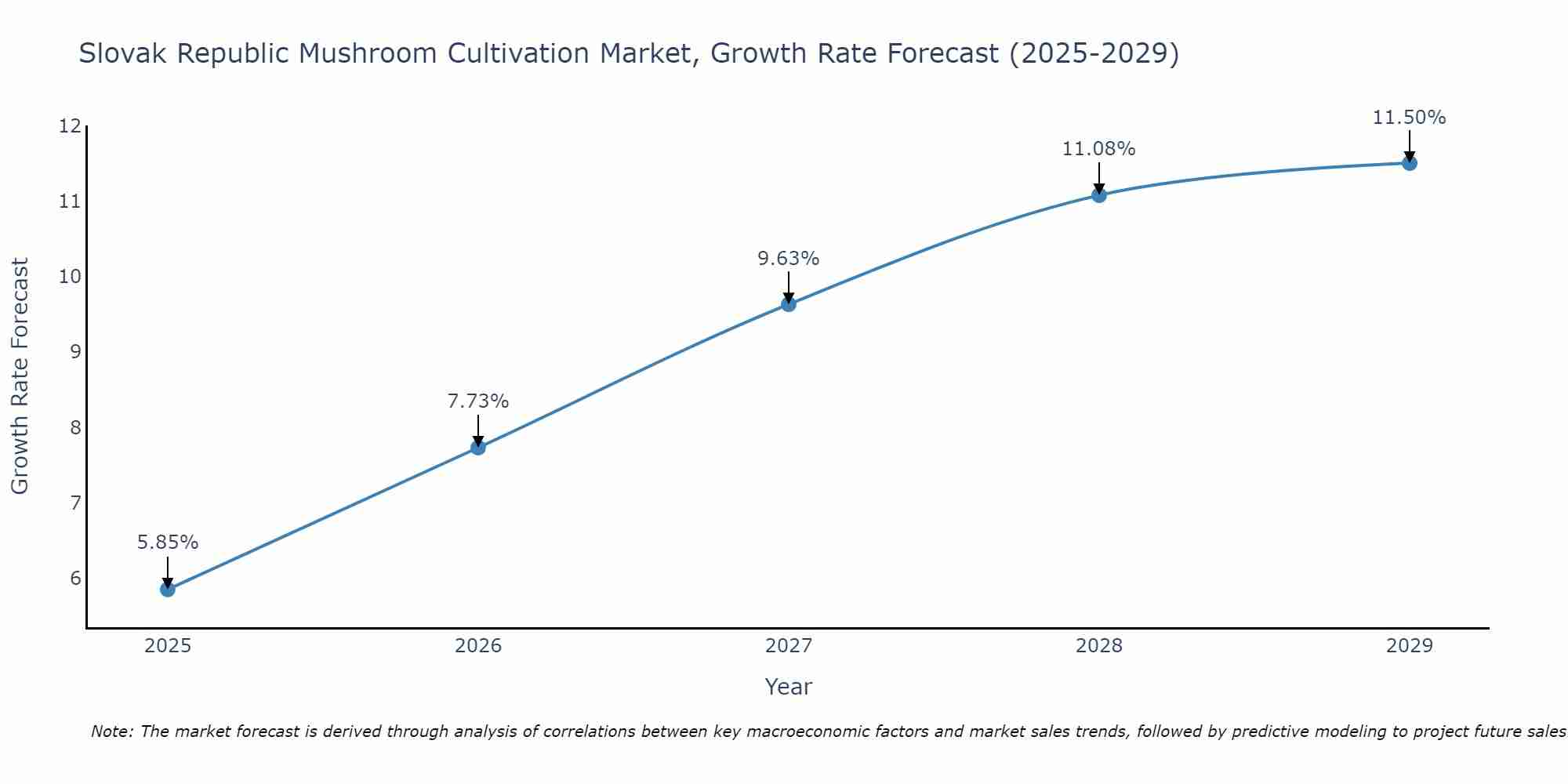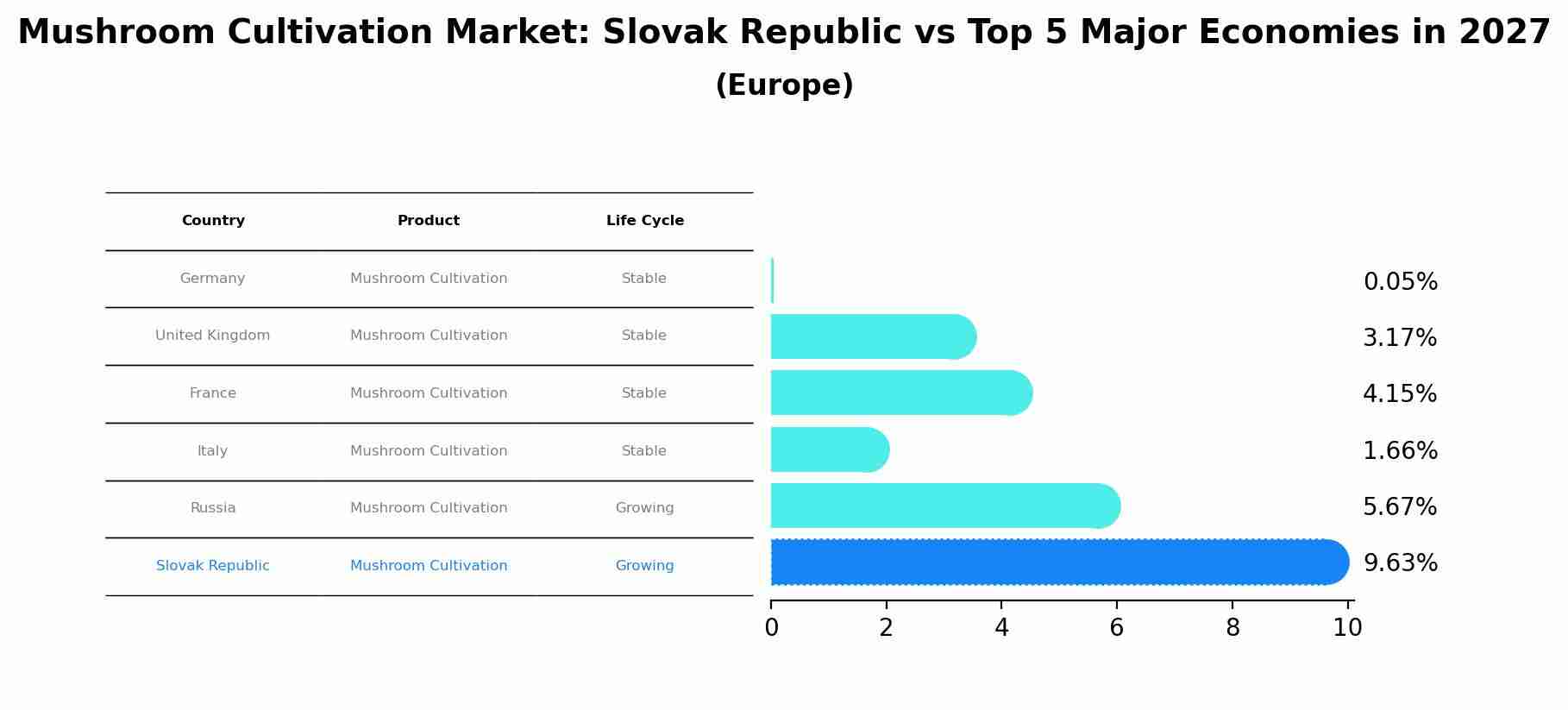Slovakia Mushroom Cultivation Market Outlook | Share, COVID-19 IMPACT, Forecast, Trends, Industry, Companies, Value, Growth, Analysis, Size & Revenue
| Product Code: ETC383120 | Publication Date: Aug 2022 | Updated Date: Jul 2025 | Product Type: Market Research Report | |
| Publisher: 6Wresearch | Author: Shubham Padhi | No. of Pages: 75 | No. of Figures: 35 | No. of Tables: 20 |
Slovak Republic Mushroom Cultivation Market Size Growth Rate
The Slovak Republic Mushroom Cultivation Market is likely to experience consistent growth rate gains over the period 2025 to 2029. Commencing at 5.85% in 2025, growth builds up to 11.50% by 2029.

Mushroom Cultivation Market: Slovak Republic vs Top 5 Major Economies in 2027 (Europe)
The Mushroom Cultivation market in Slovak Republic is projected to grow at a growing growth rate of 9.63% by 2027, highlighting the country's increasing focus on advanced technologies within the Europe region, where Germany holds the dominant position, followed closely by United Kingdom, France, Italy and Russia, shaping overall regional demand.

Slovakia Mushroom Cultivation Market Synopsis
The Slovakia Mushroom Cultivation Market is experiencing steady growth due to increasing consumer awareness of the health benefits associated with mushrooms. Oyster mushrooms, champignon mushrooms, and shiitake mushrooms are among the most popular varieties cultivated in the country. The market is driven by factors such as the rising demand for organic and locally sourced produce, as well as the growing trend of incorporating mushrooms into various cuisines. Technological advancements in cultivation techniques and sustainable practices are further propelling the market growth. Additionally, the presence of a well-established distribution network and favorable government initiatives to promote mushroom cultivation are contributing to the overall expansion of the Slovakia Mushroom Cultivation Market.
Slovakia Mushroom Cultivation Market Trends
In Slovakia, the mushroom cultivation market is experiencing a trend towards sustainable and organic practices, driven by increasing consumer demand for healthier and environmentally friendly food products. This has led to a growing number of mushroom farmers adopting organic cultivation methods and seeking certification to cater to this niche market segment. Additionally, there is a rising interest in exotic and gourmet mushroom varieties among consumers, leading to diversification in the types of mushrooms being cultivated in the country. Technological advancements in cultivation techniques, such as controlled environment systems and automation, are also being adopted to improve efficiency and yield. Overall, the Slovakia mushroom cultivation market is witnessing a shift towards sustainability, diversity, and innovation to meet the evolving needs of consumers.
Slovakia Mushroom Cultivation Market Challenges
In the Slovakia Mushroom Cultivation Market, some of the key challenges faced include competition from imported mushrooms, fluctuating raw material prices, and limited technical knowledge among small-scale growers. Imported mushrooms, particularly from neighboring countries, can offer lower prices, posing a threat to local producers. Fluctuating raw material prices, such as substrate materials and energy costs, can impact profitability and production consistency. Additionally, many small-scale growers may lack access to advanced cultivation techniques and technologies, hindering their ability to scale up and compete effectively. Overcoming these challenges requires strategic pricing strategies, improved supply chain management, and increased knowledge sharing and training initiatives to enhance the overall productivity and competitiveness of the Slovakia Mushroom Cultivation Market.
Slovakia Mushroom Cultivation Market Investment Opportunities
The Slovakia Mushroom Cultivation Market presents promising investment opportunities due to the growing demand for mushrooms both domestically and internationally. With a strong agricultural tradition and favorable climatic conditions for mushroom cultivation, Slovakia has the potential to become a significant player in the global mushroom market. Investors can consider opportunities in mushroom farming operations, value-added mushroom products such as dried or processed mushrooms, and technology solutions for efficient cultivation and processing. Additionally, there is a rising interest in specialty and medicinal mushrooms, offering niche markets for investors to explore. Collaborations with research institutions and government initiatives supporting agricultural innovation can further enhance the growth prospects in this sector, making it an attractive investment avenue for those looking to capitalize on the increasing popularity of mushrooms.
Jordan Agar Market Government Policies
In Slovakia, mushroom cultivation is regulated by the Ministry of Agriculture and Rural Development, which sets standards for the production, processing, and marketing of mushrooms. The government provides support and subsidies to promote sustainable cultivation practices, research and development initiatives, and training programs for mushroom growers. Additionally, there are regulations in place to ensure food safety and quality standards are met throughout the supply chain. The government also encourages innovation and technology adoption in the mushroom cultivation sector to enhance competitiveness and market access. Overall, government policies in Slovakia aim to foster a thriving and environmentally sustainable mushroom cultivation market through a combination of regulatory frameworks, financial incentives, and capacity-building measures.
Slovakia Mushroom Cultivation Market Future Outlook
The future outlook for the Slovakia Mushroom Cultivation Market appears promising due to increasing consumer interest in healthy and plant-based diets. Mushrooms are gaining popularity as a nutritious and versatile ingredient, driving demand for locally grown varieties. Additionally, the growing awareness of the environmental benefits of mushroom cultivation, such as its sustainable and low-impact nature, is expected to further fuel market growth. The development of innovative cultivation techniques and technologies, coupled with government initiatives to support the agriculture sector, are likely to contribute to the expansion of the Slovakia Mushroom Cultivation Market in the coming years. Overall, the market is poised for steady growth as consumers continue to embrace mushrooms as a healthy and sustainable food choice.
Key Highlights of the Report:
- Slovakia Mushroom Cultivation Market Outlook
- Market Size of Slovakia Mushroom Cultivation Market, 2021
- Forecast of Slovakia Mushroom Cultivation Market, 2031
- Historical Data and Forecast of Slovakia Mushroom Cultivation Revenues & Volume for the Period 2018 - 2031
- Slovakia Mushroom Cultivation Market Trend Evolution
- Slovakia Mushroom Cultivation Market Drivers and Challenges
- Slovakia Mushroom Cultivation Price Trends
- Slovakia Mushroom Cultivation Porter's Five Forces
- Slovakia Mushroom Cultivation Industry Life Cycle
- Historical Data and Forecast of Slovakia Mushroom Cultivation Market Revenues & Volume By Type for the Period 2018 - 2031
- Historical Data and Forecast of Slovakia Mushroom Cultivation Market Revenues & Volume By Button Mushroom for the Period 2018 - 2031
- Historical Data and Forecast of Slovakia Mushroom Cultivation Market Revenues & Volume By Oyster Mushroom for the Period 2018 - 2031
- Historical Data and Forecast of Slovakia Mushroom Cultivation Market Revenues & Volume By Shiitake Mushroom for the Period 2018 - 2031
- Historical Data and Forecast of Slovakia Mushroom Cultivation Market Revenues & Volume By Others for the Period 2018 - 2031
- Slovakia Mushroom Cultivation Import Export Trade Statistics
- Market Opportunity Assessment By Type
- Slovakia Mushroom Cultivation Top Companies Market Share
- Slovakia Mushroom Cultivation Competitive Benchmarking By Technical and Operational Parameters
- Slovakia Mushroom Cultivation Company Profiles
- Slovakia Mushroom Cultivation Key Strategic Recommendations
Frequently Asked Questions About the Market Study (FAQs):
- Single User License$ 1,995
- Department License$ 2,400
- Site License$ 3,120
- Global License$ 3,795
Search
Thought Leadership and Analyst Meet
Our Clients
Related Reports
- Afghanistan Apparel Market (2026-2032) | Growth, Outlook, Industry, Segmentation, Forecast, Size, Companies, Trends, Value, Share, Analysis & Revenue
- Canada Oil and Gas Market (2026-2032) | Share, Segmentation, Value, Industry, Trends, Forecast, Analysis, Size & Revenue, Growth, Competitive Landscape, Outlook, Companies
- Germany Breakfast Food Market (2026-2032) | Industry, Share, Growth, Size, Companies, Value, Analysis, Revenue, Trends, Forecast & Outlook
- Australia Briquette Market (2025-2031) | Growth, Size, Revenue, Forecast, Analysis, Trends, Value, Share, Industry & Companies
- Vietnam System Integrator Market (2025-2031) | Size, Companies, Analysis, Industry, Value, Forecast, Growth, Trends, Revenue & Share
- ASEAN and Thailand Brain Health Supplements Market (2025-2031) | Strategy, Consumer Insights, Analysis, Investment Trends, Opportunities, Growth, Size, Share, Industry, Revenue, Segments, Value, Segmentation, Supply, Forecast, Restraints, Outlook, Competition, Drivers, Trends, Demand, Pricing Analysis, Competitive, Strategic Insights, Companies, Challenges
- ASEAN Bearings Market (2025-2031) | Strategy, Consumer Insights, Analysis, Investment Trends, Opportunities, Growth, Size, Share, Industry, Revenue, Segments, Value, Segmentation, Supply, Forecast, Restraints, Outlook, Competition, Drivers, Trends, Demand, Pricing Analysis, Competitive, Strategic Insights, Companies, Challenges
- Europe Flooring Market (2025-2031) | Outlook, Share, Industry, Trends, Forecast, Companies, Revenue, Size, Analysis, Growth & Value
- Saudi Arabia Manlift Market (2025-2031) | Outlook, Size, Growth, Trends, Companies, Industry, Revenue, Value, Share, Forecast & Analysis
- Uganda Excavator, Crane, and Wheel Loaders Market (2025-2031) | Strategy, Consumer Insights, Analysis, Investment Trends, Opportunities, Growth, Size, Share, Industry, Revenue, Segments, Value, Segmentation, Supply, Forecast, Restraints, Outlook, Competition, Drivers, Trends, Demand, Pricing Analysis, Competitive, Strategic Insights, Companies, Challenges
Industry Events and Analyst Meet
Whitepaper
- Middle East & Africa Commercial Security Market Click here to view more.
- Middle East & Africa Fire Safety Systems & Equipment Market Click here to view more.
- GCC Drone Market Click here to view more.
- Middle East Lighting Fixture Market Click here to view more.
- GCC Physical & Perimeter Security Market Click here to view more.
6WResearch In News
- Doha a strategic location for EV manufacturing hub: IPA Qatar
- Demand for luxury TVs surging in the GCC, says Samsung
- Empowering Growth: The Thriving Journey of Bangladesh’s Cable Industry
- Demand for luxury TVs surging in the GCC, says Samsung
- Video call with a traditional healer? Once unthinkable, it’s now common in South Africa
- Intelligent Buildings To Smooth GCC’s Path To Net Zero


















